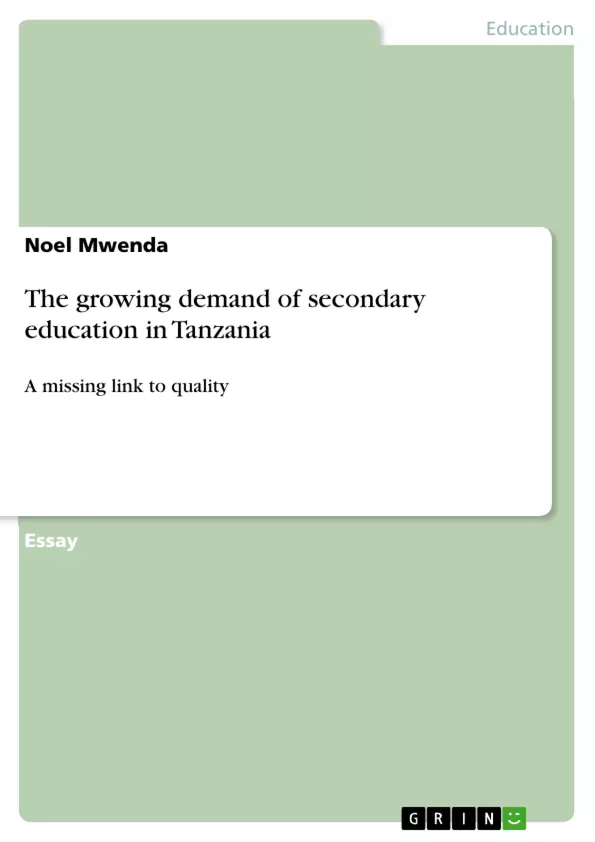This paper is about the growing demand of secondary education in Tanzania and it shows a blink of a missing link to quality. It further defines the overlooked terms by many such as education quality and quality it self. It defines education and what a secondary school education mean and it tresses the growths of education in Tanzania. Just as preferred by (Samra and Rajan, 2006) in most cases in the context of this work primary and secondary education are treated together, because they are inextricably linked in so many ways, and because success at the secondary level is fundamentally dependent on getting the basics right at the primary level. In its briefest sense the work is divided into introduction, discussion of different factors influencing education quality in the context of Tanzania and it provides way forward to curb the withering factors to quality education and its conclusion is made forth.
Inhaltsverzeichnis (Table of Contents)
- Abstract
- Introduction
- What is Secondary Education?
- What is Secondary School?
- Factors which influence Education Quality:
- Other attributes of Quality Education:
- Reasons for Expansion of Secondary Schools in Tanzania:
- Key policy Challenges:
- Policy challenge one: Establish clear targets
- Policy challenge two: Focus on outcomes, not inputs.….……………………..\n
- Policy challenge three: Teachers and teacher support over infrastructure.
- Policy challenge four: measuring success
- Policy challenge five: language of instruction
- Way forward:.
- Conclusion:.
Zielsetzung und Themenschwerpunkte (Objectives and Key Themes)
This paper aims to explore the growing demand for secondary education in Tanzania and its implications for the quality of education provided. It defines key terms like education quality and quality itself, delves into the historical context of education development in Tanzania, and examines the various factors influencing education quality. The paper also identifies and analyzes the major policy challenges faced in achieving quality education, with a focus on the expansion of secondary schools.
- Growing Demand for Secondary Education in Tanzania
- Quality of Education in Tanzania
- Factors Influencing Education Quality
- Policy Challenges and Solutions
- Expansion of Secondary Schools
Zusammenfassung der Kapitel (Chapter Summaries)
The paper begins by outlining the significance of education in Tanzania's development and traces its historical trajectory, focusing on the emphasis on primary education and the subsequent growth of secondary education. The concept of "homeostasis" is introduced to illustrate the dynamic nature of education systems and the need to adapt to changing demands.
A comprehensive definition of secondary education is provided, and the distinction between secondary education and secondary school is clarified. The paper then delves into the various factors influencing education quality, including the role of teachers, infrastructure, and policy measures. The importance of ensuring a balance between inputs and outputs is highlighted, and specific policy challenges related to establishing clear targets, measuring success, and addressing the language of instruction are discussed.
Schlüsselwörter (Keywords)
The main keywords and focus topics of this work include: growing demand, secondary education, quality, education quality, policy challenges, expansion of secondary schools, Tanzania, homeostasis, teacher support, infrastructure, language of instruction, education system.
Frequently Asked Questions
Why is the demand for secondary education growing in Tanzania?
The expansion is driven by the success of primary education and the increasing need for higher skill levels in the developing economy.
What is the "missing link to quality" mentioned in the paper?
While access to schools has increased, the quality of instruction, teacher support, and infrastructure has often lagged behind.
How does the paper define "Education Quality"?
It defines quality not just as inputs (like buildings) but as outcomes, including student performance and life-readiness.
What are the key policy challenges for Tanzanian education?
Challenges include establishing clear targets, focusing on teacher support over infrastructure, and addressing the language of instruction.
What is the concept of "homeostasis" in this context?
It refers to the dynamic balance and adaptation required within an education system to meet changing societal demands.
- Quote paper
- Noel Mwenda (Author), 2012, The growing demand of secondary education in Tanzania, Munich, GRIN Verlag, https://www.grin.com/document/194113



